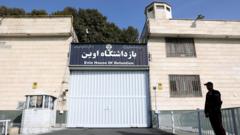**A renewed focus on diplomacy comes as military actions continue, highlighting the complex dynamics at play in the region.**
**Cease-Fire Announced Amid Ongoing Conflict Between Israel and Iran**

**Cease-Fire Announced Amid Ongoing Conflict Between Israel and Iran**
**As tensions escalate, President Trump's announcement of a cease-fire between Israel and Iran raises questions about its immediate impact and compliance from both sides.**
June 24, 2025, 6:07 a.m. Jerusalem, 6:37 a.m. Tehran. An unexpected cease-fire between Israel and Iran was announced late June 23 following interventions by President Trump and Qatari officials. However, both nations continued military exchanges, leading to uncertainty about the agreement’s implementation.
Tehran – Following an intense week of missile strikes between Israel and Iran, President Trump declared a cease-fire that has yet to be ratified by either side. Iranian Foreign Minister Abbas Araghchi confirmed the cease-fire's commencement at 4 a.m. local time, suggesting Iran's military had been engaged up until that moment. However, an Israeli spokesman refrained from confirming the cease-fire, indicating military actions were ongoing.
The announcement came shortly after American bombers struck Iranian nuclear facilities, escalating tensions in the region. Despite reports of missile launches targeting Israel and retaliatory strikes from both sides, the possibility of renewed dialogue and peace efforts is once again in focus.
Trump’s declaration marks a significant shift as American and Israeli military operations were simultaneously ramping up. In a post on social media, Trump assured the world that peace was imminent but cautioned that military activities would continue in phases before a full cessation of hostilities.
Sources indicated the cease-fire was brokered through Qatari mediation, persuading Iran to accept the proposal, allegedly after discussions regarding Israel's commitment to halt its attacks. Yet, skepticism remains regarding the effectiveness of this multilateral intervention, particularly in light of immediate attacks following the announcement.
The conflict continues to inflict economic repercussions, as fluctuations in oil prices reflect market reactions to the hostilities. Calls for a renewed diplomatic process echoed through international channels, emphasizing the need for a sustainable resolution to prevent further escalation.
Military developments include the activation of air raid alerts in Israel as missile threats persisted, and reports emerged of missiles targeting the strategic Al Udeid Air Base, home to thousands of American troops. Fortunately, defense systems reportedly intercepted a majority of incoming projectiles.
Highlighting the intricate history of US-Iran relations, analysts suggest Iran's missile strikes may have been calculated to limit damage while still showcasing retaliation capabilities. This mirrors their previous calculated responses, hinting at a desire for diplomatic avenues rather than unrestrained military escalation.
As both sides navigate this tense moment, the potential for longer-term resolution and stability remains hinged on sustained diplomatic engagement and the careful management of military actions moving forward.
Tehran – Following an intense week of missile strikes between Israel and Iran, President Trump declared a cease-fire that has yet to be ratified by either side. Iranian Foreign Minister Abbas Araghchi confirmed the cease-fire's commencement at 4 a.m. local time, suggesting Iran's military had been engaged up until that moment. However, an Israeli spokesman refrained from confirming the cease-fire, indicating military actions were ongoing.
The announcement came shortly after American bombers struck Iranian nuclear facilities, escalating tensions in the region. Despite reports of missile launches targeting Israel and retaliatory strikes from both sides, the possibility of renewed dialogue and peace efforts is once again in focus.
Trump’s declaration marks a significant shift as American and Israeli military operations were simultaneously ramping up. In a post on social media, Trump assured the world that peace was imminent but cautioned that military activities would continue in phases before a full cessation of hostilities.
Sources indicated the cease-fire was brokered through Qatari mediation, persuading Iran to accept the proposal, allegedly after discussions regarding Israel's commitment to halt its attacks. Yet, skepticism remains regarding the effectiveness of this multilateral intervention, particularly in light of immediate attacks following the announcement.
The conflict continues to inflict economic repercussions, as fluctuations in oil prices reflect market reactions to the hostilities. Calls for a renewed diplomatic process echoed through international channels, emphasizing the need for a sustainable resolution to prevent further escalation.
Military developments include the activation of air raid alerts in Israel as missile threats persisted, and reports emerged of missiles targeting the strategic Al Udeid Air Base, home to thousands of American troops. Fortunately, defense systems reportedly intercepted a majority of incoming projectiles.
Highlighting the intricate history of US-Iran relations, analysts suggest Iran's missile strikes may have been calculated to limit damage while still showcasing retaliation capabilities. This mirrors their previous calculated responses, hinting at a desire for diplomatic avenues rather than unrestrained military escalation.
As both sides navigate this tense moment, the potential for longer-term resolution and stability remains hinged on sustained diplomatic engagement and the careful management of military actions moving forward.





















